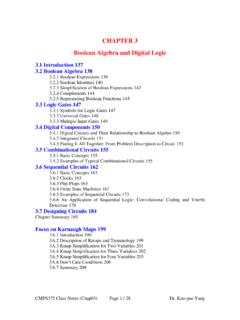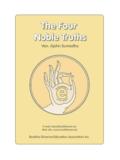Transcription of THE (HONEST) TRUTH - Weebly
1 THE ( honest ) TRUTHABOUT DISHONESTYHow We Lie to Everyone Especially OurselvesDAN ARIELYD edicationTo my teachers, collaborators, and students, for making research fun and to all the participants who took part in our experiments over the years you arethe engine of this research, and I am deeply grateful for all your PageDedication INTRODUCTION: Why Is Dishonesty So Interesting?From Enron to our own misbehaviors .. A fascination with cheating .. Becker s parking problemand the birth of rational crime .. Elderly volunteers and petty thieves .. Why behavioraleconomics and dishonesty? CHAPTER 1: Testing the Simple Model of Rational Crime (SMORC)Get rich cheating .. Tempting people to cheat, the measure of dishonesty .. What we knowversus what we think we know about dishonesty .. Cheating when we can t get caught .. Marketvendors, cab drivers, and cheating the blind.
2 Fishing and tall tales .. Striking a balancebetween TRUTH and cheating. CHAPTER 2: Fun with the Fudge FactorWhy some things are easier to steal than others .. How companies pave the way for dishonesty .. Token dishonesty .. How pledges, commandments, honor codes, and paying with cash cansupport honesty .. But lock your doors just the same .. And a bit about religion, the IRS, andinsurance companies. CHAPTER 2B: GolfMan versus himself .. A four-inch lie .. Whether tis nobler in the mind to take the mulligan ..Schr dinger s scorecard. CHAPTER 3: Blinded by Our Own MotivationsCraze lines, tattoos, and how conflicts of interest distort our perception .. How favors affect ourchoices .. Why full disclosure and other policies aren t fully effective .. Imagining lessconflicted compensation .. Disclosure and regulation are the answers or not.
3 CHAPTER 4: Why We Blow It When We re TiredWhy we don t binge in the morning .. Willpower: another limited resource .. Judgment on anempty stomach .. How flexing our cognitive and moral muscles can make us more dishonest ..Self-depletion and a rational theory of temptation. CHAPTER 5: Why Wearing Fakes Makes Us Cheat MoreThe secret language of shoes .. From ermine to Armani and the importance of signaling .. Doknockoffs knock down our standards of honesty? .. Can gateway fibs lead to monster lies? ..When what the hell wreaks havoc .. There s no such thing as one little white lie .. Halting thedownward spiral. CHAPTER 6: Cheating OurselvesClaws and peacock tails .. When answer keys tell us what we already knew .. Overly optimisticIQ scores .. The Center for Advanced Hindsight .. Being Kubrick .. War heroes and sportsheroes who let us down.
4 Helping ourselves to a better self-image. CHAPTER 7: Creativity and Dishonesty: We Are All StorytellersThe tales we tell ourselves and how we create stories we can believe .. Why creative people arebetter liars .. Redrawing the lines until we see what we want .. When irritation spurs us onward.. How thinking creatively can get us into trouble. CHAPTER 8: Cheating as an Infection: How We Catch the Dishonesty GermCatching the cheating bug .. One bad apple really does spoil the barrel (unless that apple goes tothe University of Pittsburgh) .. How ambiguous rules + group dynamics = cultures of cheating .. A possible road to ethical health. CHAPTER 9: Collaborative Cheating: Why Two Heads Aren t Necessarily Better than OneLessons from an ambiguous boss .. All eyes are on you: observation and cheating .. Workingtogether to cheat more?
5 Or keeping one another in line .. Cheating charitably .. Buildingtrust and taking liberties .. Playing well with others. CHAPTER 10: A Semioptimistic Ending: People Don t Cheat Enough!Cheer up! Why we should not be too depressed by this book .. True crime .. Cultural differencesin dishonesty .. Politicians or bankers, who cheats more? .. How can we improve our moralhealth? ThanksList of CollaboratorsNotesBibliography and Additional ReadingsIndex About the AuthorAlso by Dan ArielyCreditsCopyrightAbout the PublisherINTRODUCTIONWhy Is Dishonesty So Interesting?There s one way to find out if a man is honest ask him. If he says yes, he is a crook. GROUCHO MARXMy interest in cheating was first ignited in 2002, just a few months after the collapse of Enron. I wasspending the week at some technology-related conference, and one night over drinks I got to meetJohn Perry Barlow.
6 I knew John as the erstwhile lyricist for the Grateful Dead, but during our chat Idiscovered that he had also been working as a consultant for a few companies including case you weren t paying attention in 2001, the basic story of the fall of the Wall Street darlingwent something like this: Through a series of creative accounting tricks helped along by the blindeye of consultants, rating agencies, the company s board, and the now-defunct accounting firm ArthurAndersen, Enron rose to great financial heights only to come crashing down when its actions could nolonger be concealed. Stockholders lost their investments, retirement plans evaporated, thousands ofemployees lost their jobs, and the company went I was talking to John, I was especially interested in his description of his own wishfulblindness. Even though he consulted for Enron while the company was rapidly spinning out of control,he said he hadn t seen anything sinister going on.
7 In fact, he had fully bought into the worldview thatEnron was an innovative leader of the new economy right up until the moment the story was all overthe headlines. Even more surprising, he also told me that once the information was out, he could notbelieve that he failed to see the signs all along. That gave me pause. Before talking to John, I assumedthat the Enron disaster had basically been caused by its three sinister C-level architects (JeffreySkilling, Kenneth Lay, and Andrew Fastow), who together had planned and executed a large-scaleaccounting scheme. But here I was sitting with this guy, whom I liked and admired, who had his ownstory of involvement with Enron, which was one of wishful blindness not one of was, of course, possible that John and everyone else involved with Enron were deeply corrupt,but I began to think that there may have been a different type of dishonesty at work one that relatesmore to wishful blindness and is practiced by people like John, you, and me.
8 I started wondering ifthe problem of dishonesty goes deeper than just a few bad apples and if this kind of wishful blindnesstakes place in other companies as well.* I also wondered whether my friends and I would havebehaved similarly if we had been the ones consulting for became fascinated by the subject of cheating and dishonesty. Where does it come from? What is thehuman capacity for both honesty and dishonesty? And, perhaps most important, is dishonesty largelyrestricted to a few bad apples, or is it a more widespread problem? I realized that the answer to thislast question might dramatically change how we should try to deal with dishonesty: that is, if only afew bad apples are responsible for most of the cheating in the world, we might easily be able toremedy the problem. Human resources departments could screen for cheaters during the hiringprocess or they could streamline the procedure for getting rid of people who prove to be dishonestover time.
9 But if the problem is not confined to a few outliers, that would mean that anyone couldbehave dishonestly at work and at home you and I included. And if we all have the potential to besomewhat criminal, it is crucially important that we first understand how dishonesty operates and thenfigure out ways to contain and control this aspect of our DO WE know about the causes of dishonesty? In rational economics, the prevailing notion ofcheating comes from the University of Chicago economist Gary Becker, a Nobel laureate whosuggested that people commit crimes based on a rational analysis of each situation. As Tim Harforddescribes in his book The Logic of Life,* the birth of this theory was quite mundane. One day, Beckerwas running late for a meeting and, thanks to a scarcity of legal parking, decided to park illegally andrisk a ticket.
10 Becker contemplated his own thought process in this situation and noted that his decisionhad been entirely a matter of weighing the conceivable cost being caught, fined, and possibly towed against the benefit of getting to the meeting in time. He also noted that in weighing the costs versusthe benefits, there was no place for consideration of right or wrong; it was simply about thecomparison of possible positive and negative thus the Simple Model of Rational Crime (SMORC) was born. According to this model, we allthink and behave pretty much as Becker did. Like your average mugger, we all seek our ownadvantage as we make our way through the world. Whether we do this by robbing banks or writingbooks is inconsequential to our rational calculations of costs and benefits. According to Becker slogic, if we re short on cash and happen to drive by a convenience store, we quickly estimate howmuch money is in the register, consider the likelihood that we might get caught, and imagine whatpunishment might be in store for us if we are caught (obviously deducting possible time off for goodbehavior).







